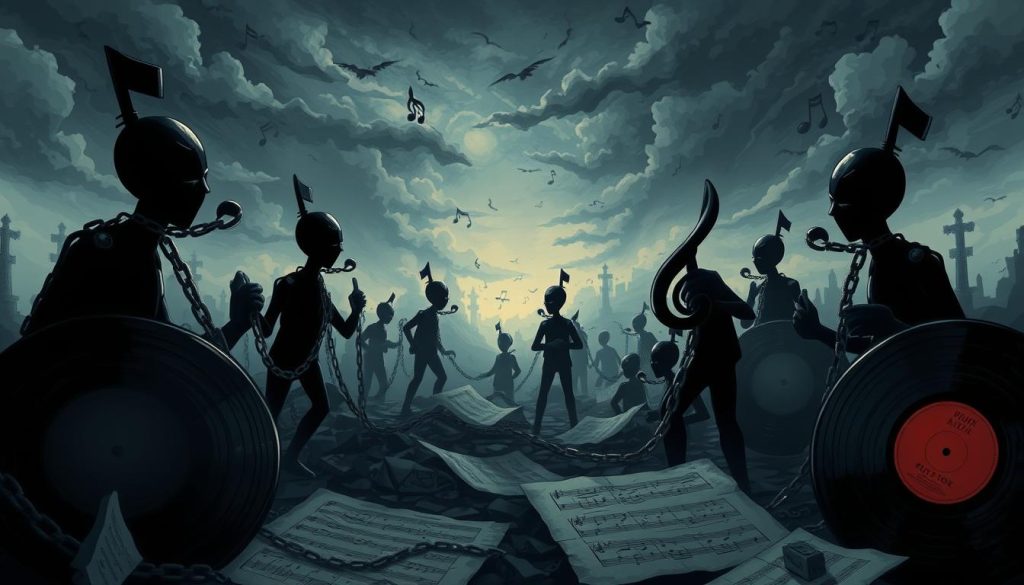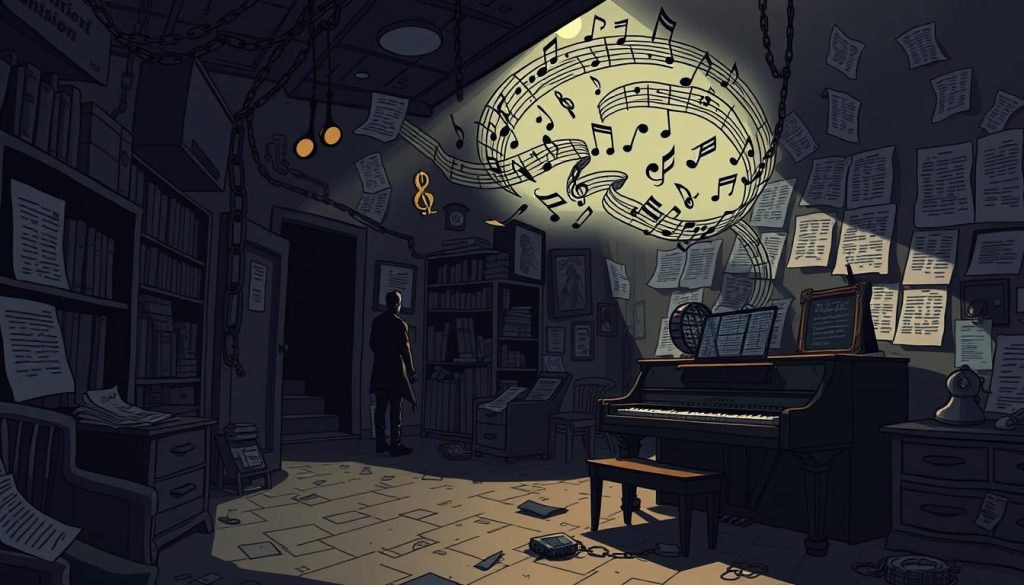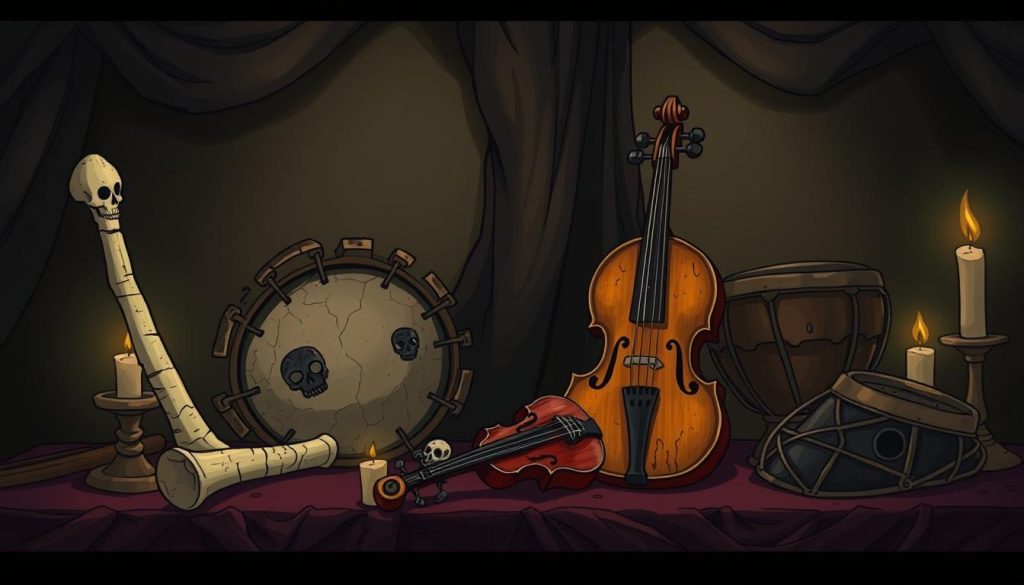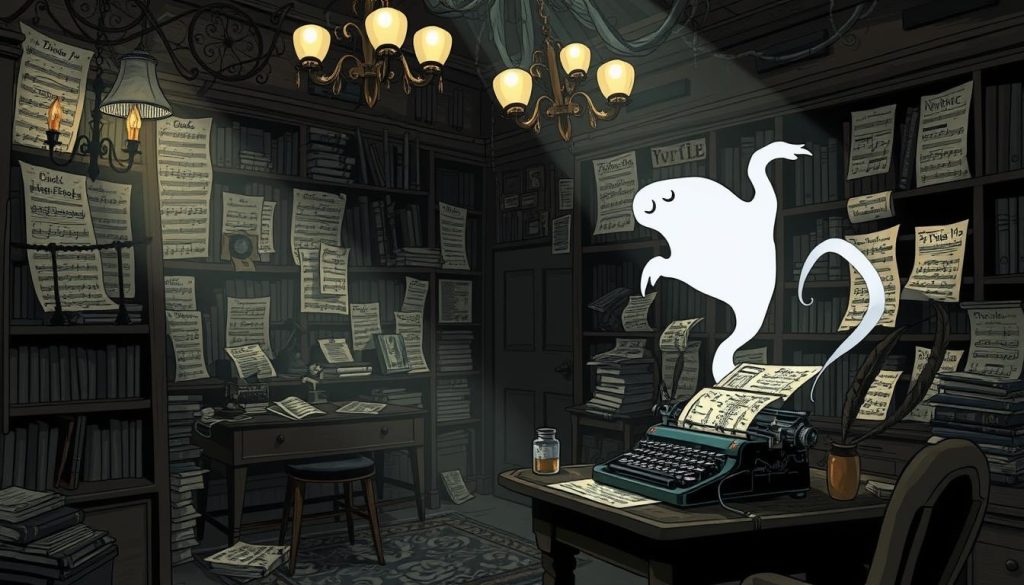As an artist or musician, you might have felt lost in the world of music publishing. This industry is full of secrets and can greatly impact your career. It’s filled with myths and beliefs that few people understand.
The music publishing world is seen as dark and unclear. Companies control artists and musicians through complex contracts. This makes artists feel trapped and powerless. This article will uncover the secrets of the music publishing industry.
Key Takeaways
- The music publishing industry is shrouded in mystery, with artists and musicians struggling to navigate its murky waters.
- Companies in the music publishing industry can exert control over artists’ careers through complex contracts and opaque business practices.
- The Faustian pact myth and the exploitation of superstitions and beliefs are tactics used by the music industry to maintain power.
- Uncovering the hidden truths behind the music industry’s underbelly can help artists and musicians better understand the challenges they face.
- Exploring alternative distribution channels and unconventional music marketing strategies can be effective in navigating the music publishing dark world.
The Crossroads Myth and Its Origins
The myth of musicians trading their soul for music at crossroads is intriguing. It’s linked to Robert Johnson, a famous country bluesman. Yet, he never said he made such a deal in his life.
The story also connects to Tommy Johnson, a blues singer. His brother LeDell shared the tale. But these stories were probably exaggerated, common in the American South back then.
American Roots of the Myth
The myth’s roots are in America’s music history. Musicians in the early 20th century wanted fame and skill. The idea of a crossroads deal became a symbol of their sacrifices for success.
“A revival of pre-war blues, including Johnson’s music, began twenty to thirty years later. There was a spate of far-from-accurate articles, books, and liner notes about Johnson.”
The myth grew stronger as time passed. The renewed interest in Robert Johnson’s music sparked more myths. This made it harder to separate fact from fiction.
Researchers like Conforth and Wardlow have debunked many myths. Their work has uncovered the real stories behind Robert Johnson. They’ve shown the true side of the music world, beyond myths.
Music Publishing Dark World: Exploitation of Fears
The music publishing industry is often shrouded in mystery. It exploits artists’ fears and superstitions. Myths like the “crossroads bargain” have made it seem like success comes from supernatural deals.
This has hurt many artists, especially those from underrepresented groups. They feel their success is controlled by forces they can’t control.
The dark side of music publishing thrives on these fears. It uses them to keep control and power. Artists who challenge the industry face threats and intimidation.
This exploration of the music publishing dark world reveals the industry’s underbelly. It shows how fears are exploited and certain subcultures are marginalized. By exposing these practices, we can fight for a fairer music industry.
“Millions of music-lovers hardly hear about music publishers, although they supposedly render considerable services behind the scenes.”
The music publishing dark world is complex. It needs a deep understanding of the industry’s history and the factors that shaped it. By looking into the crossroads myth, we can start to break the fear and control that have ruled the industry.
The Devil’s Music: Taboo Instruments
In the music publishing world, some instruments are seen as devilish and taboo. The violin and banjo are often linked to the occult. Musicians playing these instruments were seen with suspicion and superstition.
This view has shaped the music industry. It affects how certain genres and artists are seen and marketed. The idea that these instruments are connected to the supernatural has made the story of many musical styles complex and misunderstood.
European Perspectives on Musicians
In Europe, the stigma around these instruments is deep. Musicians playing the violin or banjo were accused of working with the devil. Their performances were seen as a challenge to the religious and social order.
This suspicion went beyond the instruments. It also targeted the musicians themselves. They were seen as threats to the established order.
The impact of this view is clear in how certain genres were received. The blues and bluegrass, relying on these “cursed” instruments, were seen as outsiders. They were not accepted by mainstream music.
| Instrument | Perceived Association | Notable Musicians |
|---|---|---|
| Violin | The Devil’s Fiddle | Niccolò Paganini, Ole Bornemann Bull |
| Banjo | Instrument of the Occult | Pete Seeger, Earl Scruggs |
The legacy of these “devil’s instruments” still affects the music industry. The business side of music is often shrouded in mystery and superstition. It’s unclear if these taboos will fade or continue to influence the industry.
Superstitions and Beliefs in the Turn-of-the-Century America
In the early 20th century, America was captivated by the supernatural. The music publishing dark world and music industry secrets were shrouded in mystery. People believed the line between the physical and spiritual was thin. This belief greatly influenced how musicians entered the industry.
The time was filled with European, British, and African superstitions. Musicians, seen as messengers of the unknown, walked a thin line. Their work was both celebrated and feared. The music industry, a world of shadows, was also touched by these beliefs. Many sought to use the supernatural to succeed in the competitive music publishing world.
| Superstition/Belief | Origin | Impact on Music Industry |
|---|---|---|
| Crossroads Myth | African American folklore | Believed to be a place where musicians could make a Faustian pact with the devil to achieve success |
| Cursed Instruments | European folklore | Certain instruments, like the fiddle, were seen as conduits for the devil, leading to their stigmatization in the industry |
| Haunted Recording Studios | Urban legends | Rumors of ghostly presences in studios led to increased paranoia and superstition among musicians and producers |
The music publishing dark world and music industry secrets were deeply connected to supernatural beliefs. This created a complex and unsettling environment for those trying to break into niche music markets. Knowing this history is key to understanding the music industry’s past and present. The echoes of these superstitions still resonate in the music publishing dark world.
The Crossroads Bargain: Real or Myth?
The idea of musicians trading their souls for talent at crossroads has long fascinated many. Stories like LeDell Johnson’s seem to support this myth. Yet, experts and scholars often call these tales mere superstition or exaggeration. The debate on whether the crossroads bargain is real or just a myth is ongoing in the music world.
Accounts and Testimonies
Robert Johnson’s story is a famous example of the crossroads bargain. His life and death have inspired many books, documentaries, and songs. Many believe he traded his soul for his incredible guitar skills. But, the truth behind these claims is still up for debate.
| Musician | Crossroads Bargain Claim | Outcome |
|---|---|---|
| Robert Johnson | Traded his soul for unmatched guitar skills | Died at age 27 under mysterious circumstances |
| Niccolo Paganini | Believed to have made a Faustian bargain for his virtuosic violin playing | Became known as the “Devil’s Violinist” |
| Tommy Johnson | Claimed to have met the devil at the crossroads and learned how to play guitar | Died of mysterious causes at age 36 |
These stories have captured the public’s interest, but the proof of the crossroads bargain is mostly based on stories. Many believe these tales show the dark side of the music industry. This industry has a history of exploiting artists and their fears.
“The crossroads bargain is more about the dark, vague world of music publishing than any actual supernatural phenomenon. It’s a powerful myth that exposes the industry’s underbelly.”
music publishing dark world: Underground Practices
Explore the music publishing dark world. Here, unique marketing and independent music promotion rule. It’s a place of complex contracts, royalties, and power struggles. Artists and musicians often find it hard to understand this world.
But, there’s a hidden underground scene. It offers hope to artists and musicians. They use unconventional music marketing strategies to reach fans. They build a community through zines, cassette reviews, and word-of-mouth.
Publications like Option and online platforms have empowered the underground. They give a voice to the marginalized and challenge the industry. This has led to a more fair and artist-focused industry.
“The underground exists in neglected places and often does not fit neatly into popular or classical categories. It makes little money and is largely independent from both the market and traditional high art institutions.”
As you explore the music publishing dark world, you’ll find many stories. These stories show the strength and creativity of artists who won’t be silenced. They’re making a new path, one that values artistic freedom and challenges norms.
If you’re a musician or music lover, knowing about the underground is key. It helps artists and makes the industry more inclusive. By exploring these hidden paths, we celebrate the diversity of music.
Exposing the Music Industry Underbelly
The music publishing dark world is changing. Artists and musicians are now finding ways to get around the big publishing companies. They use alternative music distribution channels and new marketing strategies. This helps them take control of their careers and show the industry’s dark side.
Alternative Distribution Channels
Artists are using new ways to reach fans. They use platforms that give them more control and better pay. This lets them get their music out to more people than before.
- Platforms like Bandcamp and Soundcloud let artists sell their music directly to fans. They keep more of the money.
- Streaming services like Spotify and Apple Music help artists get noticed. They can make money without a big label.
- Podcasts and music shows are great for artists to share their stories. They help build a loyal fanbase.
These new channels give artists power. They can fight against the music publishing dark world that has mistreated them for too long.
“The music industry is a dark, vague world where artists often feel powerless. But by embracing alternative distribution channels, they can reclaim their voice and their rightful share of the pie.” – Music industry insider
The music industry’s future is in the hands of artists. They are breaking into niche music markets and using alternative music distribution channels to succeed.
Conclusion
The music publishing world is complex and often hidden. Artists and musicians face many challenges to succeed. By learning about the origins of myths and the industry’s dark side, you can navigate better. This helps you protect your creativity and finances.
The dark world of music publishing might seem scary. But, there are ways to uncover music industry secrets and fight against the underbelly. New paths and awareness can empower artists. This way, you can take charge of your career and art.
Music publishing is tough, but you can overcome it. You need to be strong, smart, and ready to question things. By facing the truth and pushing for change, you can achieve success. Knowing the dark world of music publishing helps you make smart choices. This way, you can find your place in the music world.
FAQ
What is the Faustian pact myth in the music industry?
How have music publishing companies exploited the fears and superstitions of artists?
What is the reputation of certain musical instruments, and how has it impacted the music industry?
How did superstitions and beliefs in the turn-of-the-century America impact the music industry?
Is the crossroads bargain a real phenomenon or a persistent myth?
What are some of the underground practices in the music publishing industry?
How are artists and musicians finding ways to bypass the traditional music publishing industry?
Source Links
- A History of Musicians and the Crossroads – OPOSSUM
- The Thirtieth Issue
- Beyond the Crossroads Myth
- Cross Road Blues
- Why Is Everyone Always Stealing Black Music? (Published 2019)
- THE BUSINESS OF MUSIC Reflections of a music Publisher by Ernst Roth Part 1 Ch4 : MusicWeb(UK)
- music – Jean Lee’s World
- Stygian Imagery: “Spellbound?” and the Dangers of the Devil’s Music
- Superstition in the modern world
- “Our Religion and Superstition Was All Mixed Up”: Conjure, Christianity, and African American Supernatural Traditions
- Ed Simon’s playlist for his book “Devil’s Contract”
- At the crossroads as Robert Johnson centennial nears
- Sounds of the Underground
- Assembling a Black Counter Culture
- Kanye’s Contracts Reveal Dark Truths About the Music Industry
- 13 Essential Music Industry Podcasts, From ‘Song Exploder’ to ‘Mogul’
- RACISM IN ROMANTIC MUSIC (4): CANONICAL SILENCING, AND SOME CONCLUSIONS
- The Conclusion of Wingfeather Saga
- Conclusion




